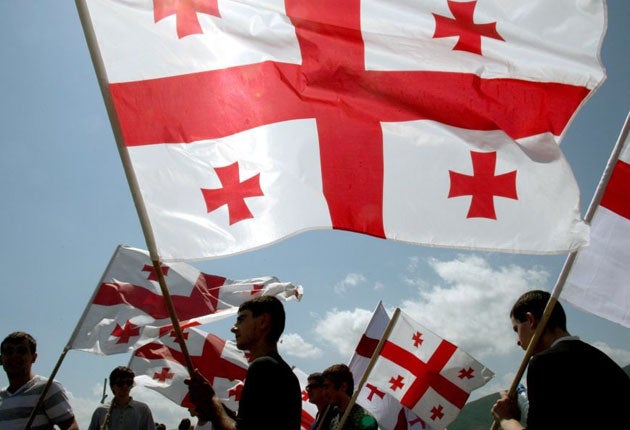One year on, South Ossetia is braced for renewed battle
Forces on high alert as war of words escalates over breakaway state

As the first anniversary of the Russian invasion of Georgia draws closer, tensions are again rising in South Ossetia, the breakaway territory over which the war last August was fought. The rhetoric coming out of Moscow and the Georgian capital of Tbilisi has escalated over the past week, as both capitals accuse the other of "provocations", and armed forces in the region are on high alert.
In Tskhinvali, the capital of South Ossetia, preparations are under way to mark the Georgian attack on the city last year and the tiny statelet is preparing its forces for the possibility of renewed conflict.
"We are ready to fight, and we're better prepared than last year," said Igor Algorov, a commander in the South Ossetian Army, who was directing a training exercise yesterday. "We don't want war again but we can't exclude that there will be revanchist feelings among the Georgians and so we have to be ready at all times."
The South Ossetian regime claims that a number of villages, and Tskhinvali itself, have come under attack from mortars fired from Georgia in recent days. In turn, Georgia insists that Ossetian and Russian troops have been advancing from Ossetian villages, attempting to move the de facto border further into Russia. Both sides have denounced the others' claims as without basis and accuse each other of engaging in provocative behaviour.
Adding to the problem is the lack of international monitoring in the region. The Organisation for Security and Co-operation in Europe, which previously monitored the conflict zone, was forced to leave a month ago after Russia insisted that it could only operate if it recognised South Ossetia's independence. The EU has a small monitoring mission in Georgia but it is unable to enter South Ossetia itself.
The war started on 7 August, when Georgia's Western-leaning President, Mikheil Saakashvili, ordered an assault on Tskhinvali. The Georgians vowed that they were acting to "restore constitutional order" in South Ossetia, though the story was later changed and Mr Saakashvili insisted that he had only acted in response to news of a Russian invasion.
Russia responded swiftly and brutally, pushing back the Georgians from South Ossetia and briefly occupying whole swathes of territory inside Georgia proper.
As a result, the Georgians lost control over even those areas of South Ossetia that it had governed before the war and Russia recognised South Ossetia and the other Georgian breakaway state of Abkhazia as independent countries.
South Ossetia, while nominally independent, now functions in effect as a region of Russia. The rouble is used as a currency and most people have Russian passports. Few think that the Georgians, militarily and psychologically crippled in last year's conflict, would attempt another military attempt to regain South Ossetia. They know that the response from Russia would be swift and brutal.
It is also clear that the Ossetian rebels have little appetite for renewed conflict. Despite paying a high human price last summer, the Ossetians gained what they had wanted for more than 15 years – control over the whole of their territory and official recognition by Russia of their independence from Georgia. Russia has also insisted that it is not looking for a new conflict, though there is known to be huge irritation among Russian leaders that Mr Saakashvili is still in power.
Russia now has nearly 1,000 troops stationed in South Ossetia, and on Wednesday afternoon at the border, a long convoy of military vehicles, including eight trucks packed with troops, could be seen crossing from Russia into the breakaway state.
In Tskhinvali, many buildings damaged during last summer's war remain uninhabited or completely destroyed. A series of events is planned to mark the anniversary of the war. It was late in the evening of this day, one year ago, that the Georgian assault on South Ossetia began and the region's residents fled to underground cellars, praying for safety.
Tonight, just before midnight, Tskhinvali residents will gather on the town's central square for an all-night candle-lit vigil to remember the estimated 200 Ossetians who died in the conflict.
Join our commenting forum
Join thought-provoking conversations, follow other Independent readers and see their replies
Comments
Bookmark popover
Removed from bookmarks